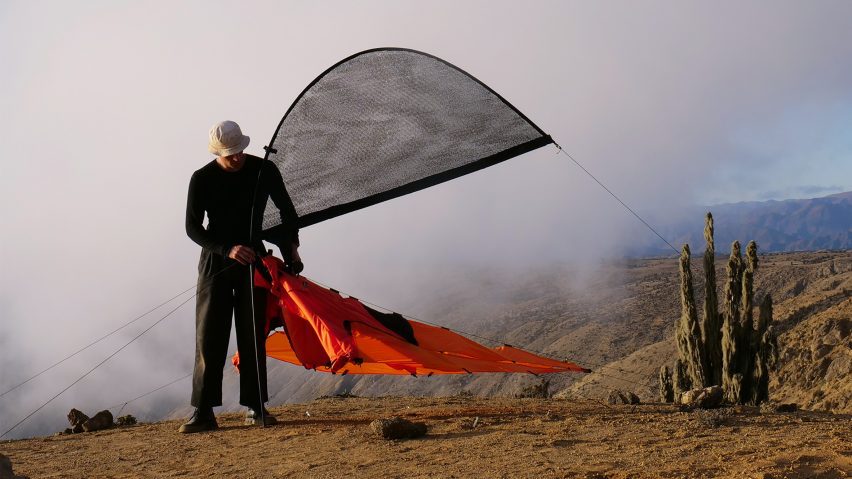Fog X, a jacket that can make drinking water from fog, has won the first public vote in the Lexus Design Awards, which recognises prototypes that aim to build a better future.
Swedish designer Pavels Hedström won the publicly voted category with the Fog-X jacket, which is designed for travellers in remote and arid locations.
The jacket enables users to trap water from the air, and can also be expanded into a one-person shelter to provide protection from another major threat in the desert, the sun.
Hedström describes Fog-X as essentially a "low-tech" device. The jacket has a sail-like expandable antenna, which holds a stretched mesh material.
Droplets of fog get caught in the mesh and are pulled down by gravity into a channel that delivers them into an integrated water bladder in the jacket. As well as catching fog, the jacket can catch mist and rain.
During a mentorship phase as part of the award, Hedström also developed a concept for an accompanying mobile app that would help users to locate foggy areas using GPS, as these spots can be scarce in the desert.
The designer developed the jacket out of concerns about water scarcity affecting the most vulnerable people on Earth. While the jacket itself might only be accessible to the privileged due to the cost – its estimated retail price is 400 euros – he thinks the concept could have a wider impact.
"The jacket itself is not the solution for water scarcity," Hedström told Dezeen. "But it shows a direction we could go down. And maybe for people like you and me, having the jacket on would change our mind about how we interact with existing ecosystems and how we approach natural resources."
At the same time, he says the technology and the design approach could be applied onto other objects and even infrastracture, or adapted into a low-cost, DIY device.
"The application actually has high potential when it comes to reaching people that have more urgency for water and don't have the money to buy a jacket for 400 euros," he said.
"The concept asks, how could we contribute to a new way of creating water infrastructure? How can we hack water infrastructures? Can we empower individual users to get access to natural resources?"
"And this takes it further than just being a jacket," he continued. "It's a vision of how we can engage with nature and build new types of infrastructures with as low impact on the environment as possible."
Hedström's initial idea was for Fog-X to be a backpack, but he eventually developed it into a jacket to make it lighter and easier to carry, swapping out the backpack's hefty water container for a water bladder concealed in the jacket.
The designer tested his prototype in Chile's Atacama Desert, one of the driest places on Earth.
Voting for the 'Your Choice' award was held both online and at an exhibition of the four Lexus Design Award-winning prototypes at Milan design week.
The other winners were Jiaming Liu with the Print Clay Humidifier, a 3D-printed device made from recycled ceramic waste and based on the practice of pouring water on the walls during hot, dry summers; Temporary Office (a collaboration between designers Vincent Lai and Douglas Lee) with Touch the Valley, a 3D topographic puzzle; and Kyeongho Park and Yejin Heo with Zero Bag, a clothing packaging design that dissolves in water and acts as a detergent.
A mentorship programme that was part of the award saw the winners work with solar designers Marjan van Aubel and Joe Doucet, sound designer Yuri Suzuki and architect Sumayya Vally to further develop their projects.
Previous water-harvesting inventions have included a fog-catcher by Alsar Atelier and Oscar Zamora in Bogotá, Colombia, that can collect 200 litres of water per week using a simple structure draped in fabric.
There's also the company Water-gen, which uses dehumidifying units to create and collect condensation and supplies its technology to areas struck by humanitarian disasters.

